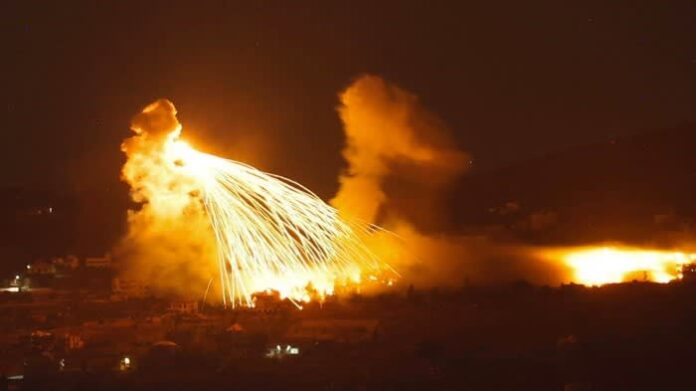Unlock the Editor’s Digest for free
Roula Khalaf, Editor of the FT, selects her favourite stories in this weekly newsletter.
Israel said it had begun a ground offensive into Lebanon, intensifying its campaign against Hizbollah after launching waves of devastating air strikes against the Lebanese militant group.
In a brief statement, the Israeli military said in the early hours of Tuesday that it had begun “limited, localised, and targeted ground raids” against Hizbollah in southern Lebanon.
It said “heavy fighting” was taking place and warned Lebanese people not to go south of the Litani River, which runs about 30km from the border.
Neither Hizbollah or Lebanon’s caretaker government commented on the land offensive, which Israel launched despite calls from its western allies for a ceasefire.
The widely expected incursion across the border is Israel’s first land offensive against Hizbollah since 2006, when it fought a 34-day war with the Iran-backed group that ended in a stalemate. It marks a further widening of the conflict that has engulfed the region since Hamas’s October 7 attack on Israel.
It follows a dramatic two-week escalation of hostilities, during which Israel assassinated Hizbollah’s leader Hassan Nasrallah, decimated its chain of command and launched an overwhelming bombing campaign that has killed more than 1,000 people in Lebanon, and displaced as many as 1mn.
Hizbollah’s deputy leader Naim Qassem said on Monday that the group would not stop its fight, and was prepared for an Israeli land offensive.
“If the Israelis want a ground incursion, the resistance forces are ready for that,” Qassem said, in the first remarks by Hizbollah’s leadership since Nasrallah’s assassination on Friday.
The Israeli land offensive was accompanied by heavy bombing of Beirut’s southern suburbs overnight, shortly after the military issued evacuation warnings to residents of several neighborhoods.
© Atef Safadi/EPA/Shutterstock
At least 95 people were killed in the past 24 hours of Israeli strikes on Lebanon’s south, north-east and the capital Beirut, the health ministry said. Israel also struck a building in Lebanon’s largest Palestinian refugee camp, in country’s south, for the first time, Lebanese media reported.
Israeli forces and Hizbollah began trading fire last year, when the Iran-backed militants launched rockets in support of Hamas the day after the Palestinian militant group’s October 7 attack.
In the ensuing months, the exchanges have displaced 60,000 people on the Israeli side of the border. Israeli forces have pounded southern Lebanon, which is controlled by Hizbollah, for months, causing massive damage and forcing more than 110,000 Lebanese people to flee the region.
© Baz Ratner/AP
For most of that time, the fighting has been contained in a limited strip of land on either side of the border. But as Israel’s war with Hamas in Gaza has lowered in intensity, its military has shifted its focus to the confrontation with Hizbollah, as well as stepping up strikes on other Iranian proxies elsewhere in the region.
Speaking to troops on Monday ahead of the operation, Israeli defence minister Yoav Gallant said his country’s goal was to “return the residents of the north to their homes”.
“We will use all the means at our disposal to achieve this goal,” he said.
Despite the damage to Hizbollah caused by Israel’s strikes, Israeli troops risk being sucked into protracted combat in the militant group’s backyard, eroding some of Israel’s technical military superiority.
The region’s most heavily armed non-state actor, thought to have tens of thousands of battle-hardened fighters and a vast arsenal of rockets and missiles, has continued to launch hundreds of projectiles at Israel since Nasrallah was killed.
Hizbollah said on Tuesday that its fighters had fired artillery at the Israeli border town of Metula as well as a “rocket salvo”.
US officials on Monday said Israel had discussed the incursion with them, adding that Washington had sought to limit the scope and duration of the operations.
There are concerns they could lead to an open-ended occupation of the border region — a fear that is also widespread in Lebanon, whose south was occupied by Israeli forces for 18 years.
The land offensive comes a week after the US and its western and Arab allies proposed a 21-day truce to the Israeli-Hizbollah conflict, warning of the risks of a wider regional war. But the US administration has also stood by Israel, sending additional troops and fighter jets to the region to help defend its ally and deter Iran.
US secretary of defence Lloyd Austin spoke to Gallant on Monday, the department of defence said in a statement.
“They agreed on the necessity of dismantling attack infrastructure along the border to ensure that Lebanese Hizbollah cannot conduct October 7-style attacks on Israel’s northern communities,” the department said. “The secretary reaffirmed that a diplomatic resolution is required to ensure that civilians can return safely to their homes on both sides of the border.”
Asked whether he was aware of reports of Israeli plans for a limited ground invasion and comfortable with one going ahead, US President Joe Biden said: “I’m more aware than you might know, and I’m comfortable with them stopping. We should have a ceasefire now.”




